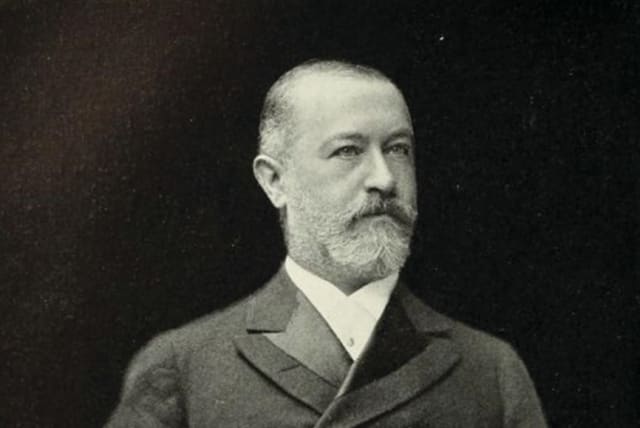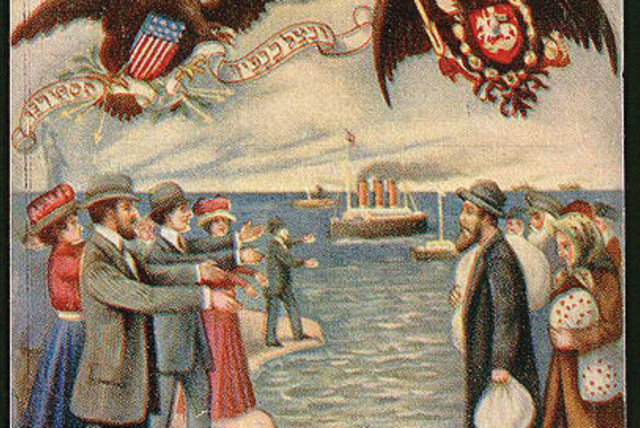'The Money Kings': History of US attitudes towards Jews, antisemitism - review

Daniel Schulman tells the story of German-Jewish immigrants who hit Wall Street, their impact on modern corporate finance, IPOs, anti-trust legislation, Zionism, and antisemitic conspiracy theories.
In 1865, 18-year-old Jacob Schiff, who felt that Frankfurt, Germany, was too small for his ambition, immigrated to the United States. Within two years, Schiff and two other Frankfurt natives formed a brokerage firm in New York City.
In 1870, he became a US citizen. Well before the end of the century, as senior partner in the multinational investment bank Kuhn Loeb, Schiff was regarded as “more closely identified with great corporate interests, especially railroads” than any other banker, with the possible exception of J.P. Morgan.
During the second half of the 19th century, other German-Jewish immigrants such as Marcus Goldman, Emanuel and Mayer Lehman, Solomon Loeb, and Joseph and Jesse Seligman also built iconic Wall Street investment firms.
In his book The Money Kings: The Epic Story of the Jewish Immigrants Who Transformed Wall Street and Shaped Modern America, Daniel Schulman (deputy Washington bureau chief of Mother Jones and author of Sons of Wichita, a biography of the Koch brothers) tells the not always well-known stories of these men, their families, and their impact on modern corporate finance, IPOs, anti-trust legislation, the creation of the Federal Reserve Bank, philanthropy, Jewish life in the United States, Zionism, and antisemitic conspiracy theories.
The Money Kings is full of illuminating information about Americans’ attitudes toward Jews.

In 1855, Schulman indicates, R.G. Dun, the nation’s premier credit agency, reported that the Lehman brothers, whose financial services firm was then based in Alabama, were worth about $50,000, much of it in real estate, and with a touch of antisemitism notes that they were “as honest and trustworthy as it is possible for Jews to be.”
At the end of the Civil War, Emanuel and Mayer Lehman, who may have traded cotton as a proxy for the Confederacy, maintained that they had opposed the war and were granted pardons and amnesty by president Andrew Johnson.
In 1877, when the exclusion of Joseph Seligman from the Grand Union Hotel in Saratoga Springs, New York, became a national scandal, Schulman reveals, the proprietor, judge Henry Hilton, declared that Seligman belonged to a “class of, not Hebrews, but Jews,” too obtuse to see they were not wanted.
Seligman is “shoddy, false, unmanly” he insisted, as “audacious as he is vulgar,” and his money “is the only token he has to push himself upon the polite.” Following a survey of other hotels, The New York Times reported that some were aghast at Hilton’s action, some complained about Jews spoiling their vacation paradises, and two establishments in Manhattan had rules similar to those at the Grand Union.
The pervasiveness of antisemitism in the United States
THE PERVASIVENESS of antisemitism, Schulman indicates, provided Jewish bankers an extra incentive to hire members of their own families and strengthen their firms through intermarriage. However, mixing family and finance also magnified disputes over compensation, the admission of new partners, and succession, “and injected sentimentality and emotion into business decisions.”
All that said, Schiff clearly commands center stage in The Money Kings, lauded by Schulman for his professional acumen, philanthropy, and dedication to the rights of Jews in the United States and around the world.
In contrast to the other “money kings,” Schulman points out, Schiff prayed each morning, partly in German, partly in Hebrew, observed Shabbat, and made a pretense of keeping kosher (except for lobster and bacon).
Adhering to the Jewish concept of tzedakah, Schiff contributed one tenth of his annual income to philanthropy, supporting an extraordinary array of institutions, such as Mount Sinai Hospital, Montefiore Hospital, the Fresh Air Fund, the Metropolitan Museum of Art (MOMA), the Museum of Natural History, Columbia University, the Henry Street Settlement, and the National Association of Activity Professionals (NAACP).
Although philanthropy “formed the bedrock of his legacy,” Schiff was quick-tempered, had “a pathological desire for control, and no compunction about taking it.” And in the war over control of the Northern Pacific Railway, he manipulated stock prices.
Using Kuhn Loeb’s clout on behalf of Jewish causes, Schiff blocked international financing of Russia during the Russo-Japanese War to punish the czar for discriminating against Jews and to create the conditions for regime change. Meanwhile, Loeb underwrote $180 million in loans for Japan, more than 20% of that nation’s wartime expenditures. During World War I, Schiff refused to finance England and France in transactions benefiting Russia, their ally. He told his partners he could not assist those who “have tortured my people and will continue to do so.”
Schiff’s stance, Schulman writes, “came at considerable expense to the firm,” and to Schiff’s reputation. He was deemed a supporter of Germany. And for decades, conspiracy theorists drew on cherry-picked “shards of truth,” including Schiff’s financial support of revolutionary propaganda in Russia, to claim he was the godfather and financial angel of the Russian Revolution, and that he personally gave the order to execute the Russian royal family.
ALONG WITH many affluent German-American Jews, Schulman reminds us, Schiff feared that the massive influx of Jews from Eastern Europe in the late 19th and early 20th century would stoke antisemitism in the United States. And so, he funded initiatives to locate these “new immigrants” to America’s rural hinterland. With news of pogroms, however, Schiff set aside his ambivalence, comparing the exodus from Russia to the escape of Israelites from Egyptian bondage. And he vigorously opposed the restrictions on immigration which were enacted into law in 1921 and 1924.
Schiff also believed that Zionism reinforced antisemitic canards that Jews were a nation unto themselves, incapable of loyalty to another state. The future of Jews, he claimed, was in “an American Israel,” ultimately composed “of the children’s children of the men and women who in this generation have come from all parts of the globe to these blessed shores.” But the Balfour Declaration and a tour of Jewish settlements in Palestine convinced Schiff that Jews “should at last have a homeland of their own.”
This concession, however, came with a caveat. Opposed to a Jewish nation, Schiff endorsed a Jewish cultural and religious entity, within a protectorate governed by another nation. Despite continued efforts to persuade him to “pay the shekel,” the fee formalizing membership in the Zionist organization, he remained at odds with the movement.
Jacob Schiff died in New York City in 1919, three days after Yom Kippur.
“No man can take his place,” sermonized rabbi and Zionist leader Stephen Wise. “Schiff is gone, and with him the Schiff era.”
Mourned by thousands, he was buried in Salem Fields, Temple Emanuel’s “city of the dead,” in what was deemed “the largest and most imposing mausoleum” in the US.
And now, in a sense, Daniel Schulman has brought him back to life.■
The reviewer is the Thomas and Dorothy Litwin professor of American Studies at Cornell University.
- THE MONEY KINGS: THE EPIC STORY OF THE JEWISH IMMIGRANTS WHO TRANSFORMED WALL STREET AND SHAPED MODERN AMERICA
- By Daniel Schulman
- Alfred A. Knopf
- 570 pages; $35
